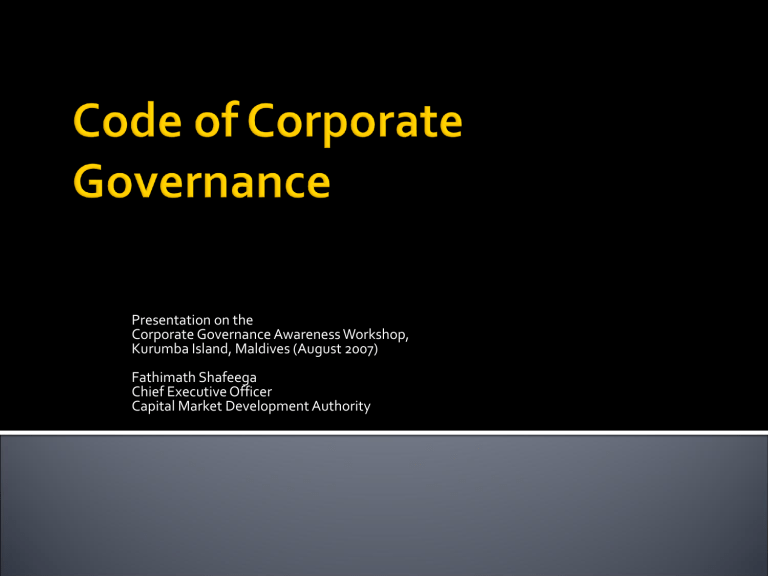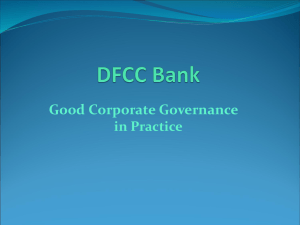Code of Corporate Governance

Presentation on the
Corporate Governance Awareness Workshop,
Kurumba Island, Maldives (August 2007)
Fathimath Shafeega
Chief Executive Officer
Capital Market Development Authority
Government ownership
Conflicts of Interest
Related party transactions
Directors mandated under Companies Act to hold shares in Company
Lack of capacity for enforcement purposes
Lack of qualified professionals in accounting and legal fields
Lack of training and awareness
Enhancement of Public Governance
Desire to use CG as tool for economic development
Main Provisions
• Board Matters
• Remuneration Matters
• Accountability And Audit
• Communication With Shareholders
What Code Says – Key Items
• Integrity in personal and professional dealings
• Wisdom and ability to take appropriate decisions
• Ability to read and understand financial statements
• An acknowledged record of business expertise and achievement so as to effectively contribute to the company’s management
• Ability to deal with others with a sense of responsibility, firmness, and cooperation
• Ability to interact with and consult with the company’s employees in order to achieve high management standards
• A track record of a range of skills and experience as well as the ability to think strategically and with foresight
• Each director must be able and prepared to devote sufficient time and effort to his duties as a director
Stand-alone and given legislative bite through Listing Manual and
Securities Act?
Compulsory for listed companies, but with some voluntary
Voluntary for public unlisted, private
More prescriptive approach
At a minimum, Governance involves
organisational structures
rules of conduct that acts as a check on insiders misusing their position or knowledge against the interest of other stakeholders
The idea is to have GOAL POSTS
R = Responsibility
A = Accountability
F = Fairness
T = Transparency
RAFT contributes to effectiveness!
Board Issues
Composition – executive, non-executives, independents – numbers of each
- Appropriate definitions
Independent directors – Importance & Sufficient numbers
Leadership
Chief Executive Officer separate from chairman
Qualifications
Role
Sub-committees of the board:
Nominating Committee
Remuneration
Audit
Training
Attendance at meetings / Quorum
Evaluation of board performance
Access to information
Tenure
Who To Appoint? And How?
• CG Code provides:
• Should be a formal and transparent process for the appointment of new directors to the Board
• Recommends that key information and the names of the directors submitted for election or re-election be disclosed to enable shareholders to make informed decisions
• Disclose the process for the selection and appointment of new directors to the Board as this ensures greater transparency in the nomination process
Executive and Non-Executive Directors
• Executive directors are the employees of the company.
– Paid salary
• Non-Executive directors (‘NEDs’) are not the employees of the company and they do not hold any other office of profit in the company or in a related company.
– Paid directors’ fees
Who Is An Independent Director?
• Have not held, or whose immediate family members have not held, during the last one (1) year, a key position in the company, such as CEO, general manager, or any immediate employment position;
• Have not, and their immediate family members have not, during the last one (1) year had any substantial financial dealings, including the receipt of remuneration, commissions, professional fees, payment for goods and services, etc with the company;
• Definition of Family Member - spouse and children
• Role
• Constructively challenge and help develop proposals on strategy; and
• Review the performance of Management in meeting agreed goals and objectives and monitor the reporting of performance.
Independence = State of Mind!!
Who Is A Nominee Director
• Person appointed to board of directors by an appointor:
– Substantial shareholder
– JV Partner
– Investor
– Creditor
• Right to appoint contained in:
– Articles of association
– Contractual documents – JVA
CEO
• Size of Board = large enough to include directors with diverse expertise and experience to suit the specific requirements of a company and its business.
• Guide = board sizes range from 7 to 10 directors, depending on the size of the company.
• Rotate the Board – maximum
6 years
Executive
Directors
Chairman
Independent
Directors
Non-Executive
Directors
• Recruiting the right team
• Guidance in CMDA Code
Main duties of the Board
The Board must always act in the best interests of the company and shareholders as a whole.
Provide leadership, set strategic aims, direction to the Management, and ensure that the necessary financial and human resources are in place for the company to meet its objectives;
Establish a framework of prudent and effective internal controls which enables risk to be assessed and managed, and monitor and assess the effectiveness of the internal controls established;
Review Management performance and determine its remuneration; and
Set the company’s values and standards, and ensure that obligations to shareholders and others are understood and met.
Chairman’s Role
Lead the Board to ensure its effectiveness on all aspects of its role and set its agenda;
Ensure that the directors receive accurate, timely and clear information;
Encourage constructive relations between the Board and Management;
Facilitate the effective contribution of non-executive directors
Encourage constructive relations between executive directors and nonexecutive directors;
Not to unilaterally issue policies without consulting with the Board as a whole with full frank and discussions being completed
Ensure effective communication with shareholders;
Promote high standards of corporate governance.
Audit
No of Members 3
Chairman Independent
Composition
Qualifications
3
Nominating
Independent
Entirely nonexecutive, majority including chairman independent
Min 2 with accounting or financial expertise or experience
-
Entirely nonexecutive, majority including chairman independent
Remuneration
-
Independent
-
Entirely nonexecutive, majority including chairman independent
Remunerate Fairly And Responsibly
Ensure that level and composition of remuneration is sufficient and reasonable
Ensure that its relationship to corporate and individual performance is defined
Means companies need to adopt remuneration policies that attract and maintain talented and motivated directors and employees so as to encourage enhanced performance of the company
Important that there be clear relationship between performance and remuneration
Important that policy underlying executive remuneration be understood by investors.
Performance Appraisal
•
•
•
Identification of performance indicators
Evaluation against performance indicators
Evaluation should be conducted at least once a year
Disclosure Of Remuneration
To disclose in Annual Report collectively:
the remuneration of directors during the year as:
▪
Director fees
▪
Other benefits, including share options, long term incentive schemes, pension benefits and preferential entitlements
To disclose voluntarily each director’s and top management remuneration
Key Duties And Liabilities
The primary duties of directors include the following:
good faith;
acting without conflict of interest;
not competing with the company
care and skill;
disclosure;
prohibition of lending to director;
filing returns;
keeping proper records and preparing financial reports; and
obligations under the Listing Manual.
Same Duty For All Directors?
Accountability Roles
Duties &
Responsibilities
Definition – The management must comprise the CEO, executive directors & key managers of the company involved in day to day activities.
Role
Relationship with board
Access to information
Necessary? YES
Qualifications
Understanding of compliance
Imply accountants, lawyers etc can play impt role
Scope of functions
Board
Management
Committees
How to engage
Information to provide
Electronic participation
Resolutions on substantially separate issues to be kept separate
Requirement for effective shareholder remedies
Financial statements to comply with Accounting Standards
Non-financial statements:
Conflict of interest
Compliance with CG measures implemented
Director remuneration
Companies operating procedure
Risk management concerns
Format for disclosure
• Absolutely essential
• Train the trainers
For board & management
Legal (including duties and liabilities) and accounting concerns
Roles and specific functions to gain better understanding
Business and strategic issues
Economic issues and changing conditions, and impact on company’s businesses
For employees:
Details of policies of company
Specific roles and duties and responsibilities, including liabilities
Criteria for CG Award
• Work undertaken to adopt governance principles
• Contribution to significant development of corporate governance practices
• Promotion of initiatives for the enhancement of future corporate governance practices
Main scope:
Fraudulent financial reporting
Misstatements arising from misappropriation of assets
Improper or unauthorized expenditures (including bribery and other improper payment schemes)
Self-dealings (including kickbacks)
Violations of laws and regulations (including those that expose the company or its agents to regulatory or criminal actions, e.g. securities frauds, signing false audit confirmations)
Pre-requisites For Enforcement
• Market maturity & level of sophistication
– Level of awareness of directors of their duties
– Shareholders of their rights and
– Presence of reputatable intermediaries
• The presence of enforcing institutions
– Integrity and efficacy of regulatory agencies
– Judicial system
• The supporting legal framework
– Relevant laws in the corporate and financial system must be firmly in place
Timelines
Voluntary
Compliance
Mandatory
Compliance
Corporate
Governance
Award
1 January 2007
1 January 2008
From 2009
1 January 2008
Some provisions will remain voluntary
Change of culture
Legal reform
More training & awareness
Shareholder activism
Independent Directors
A series of training workshops have been held
2002
2005
2006
1
st
Seminar on CG
Training Programme on CG Code
Seminar on CG
2007





